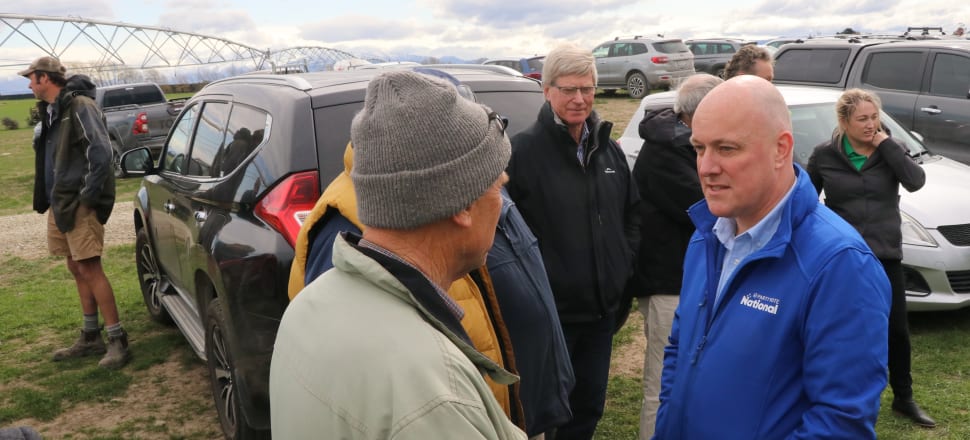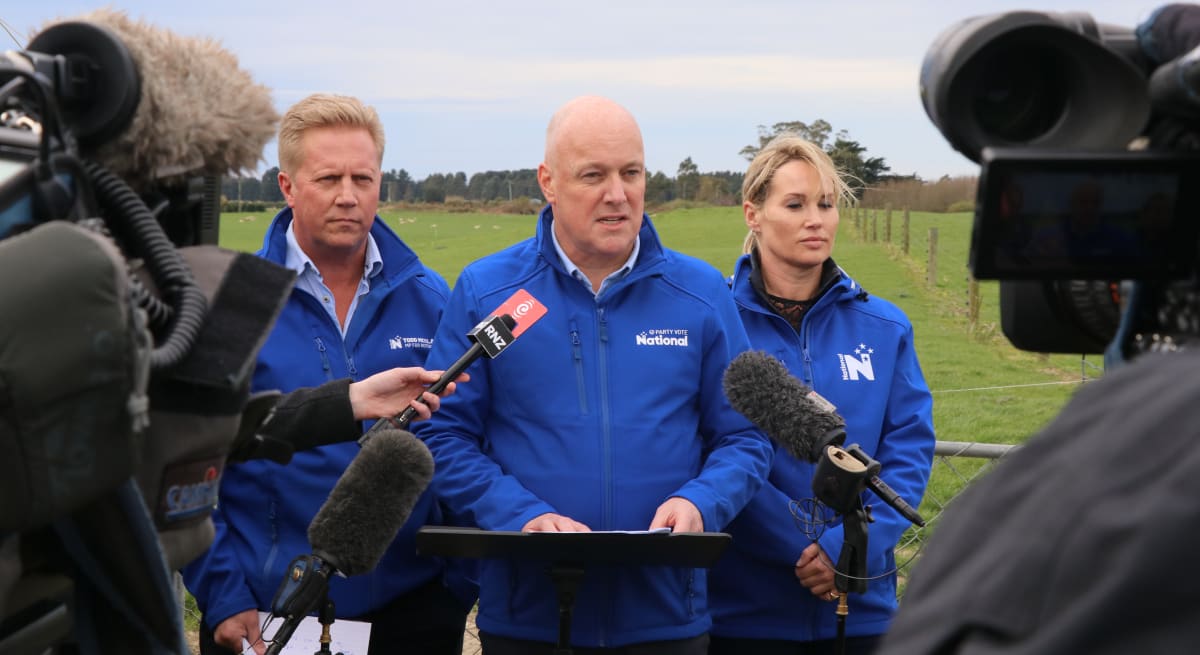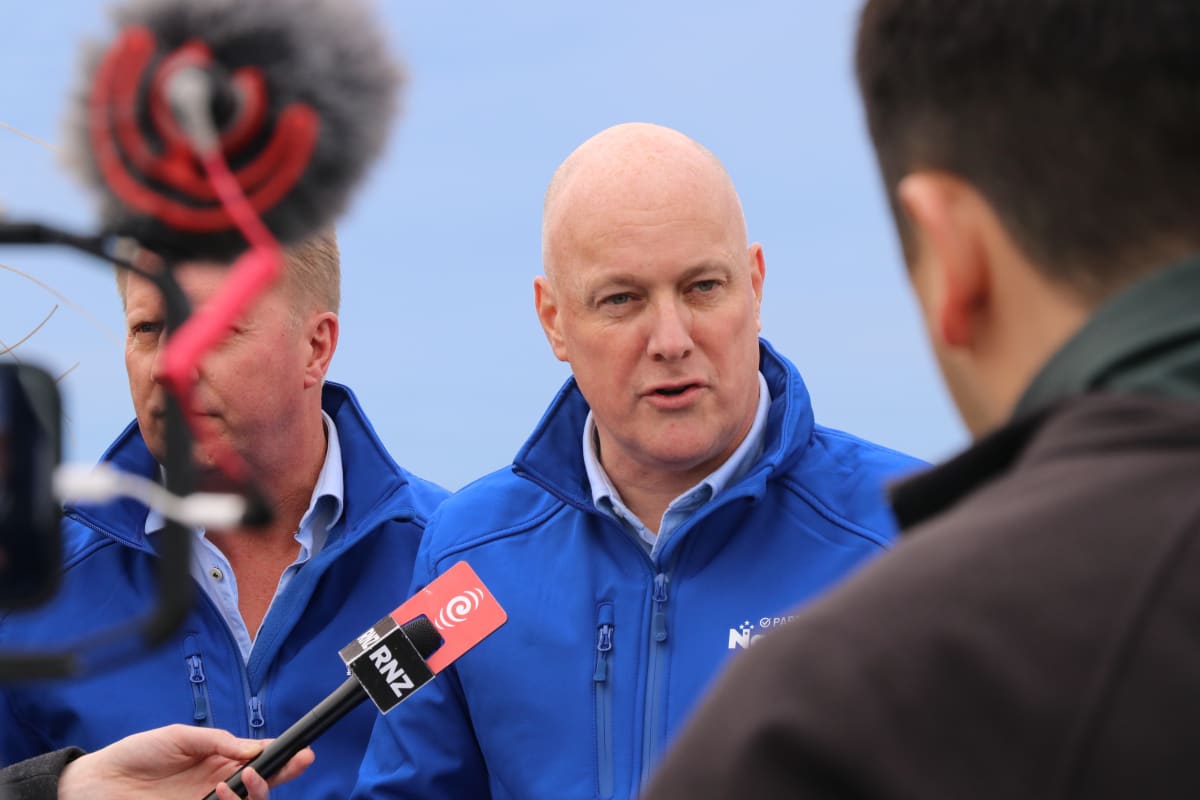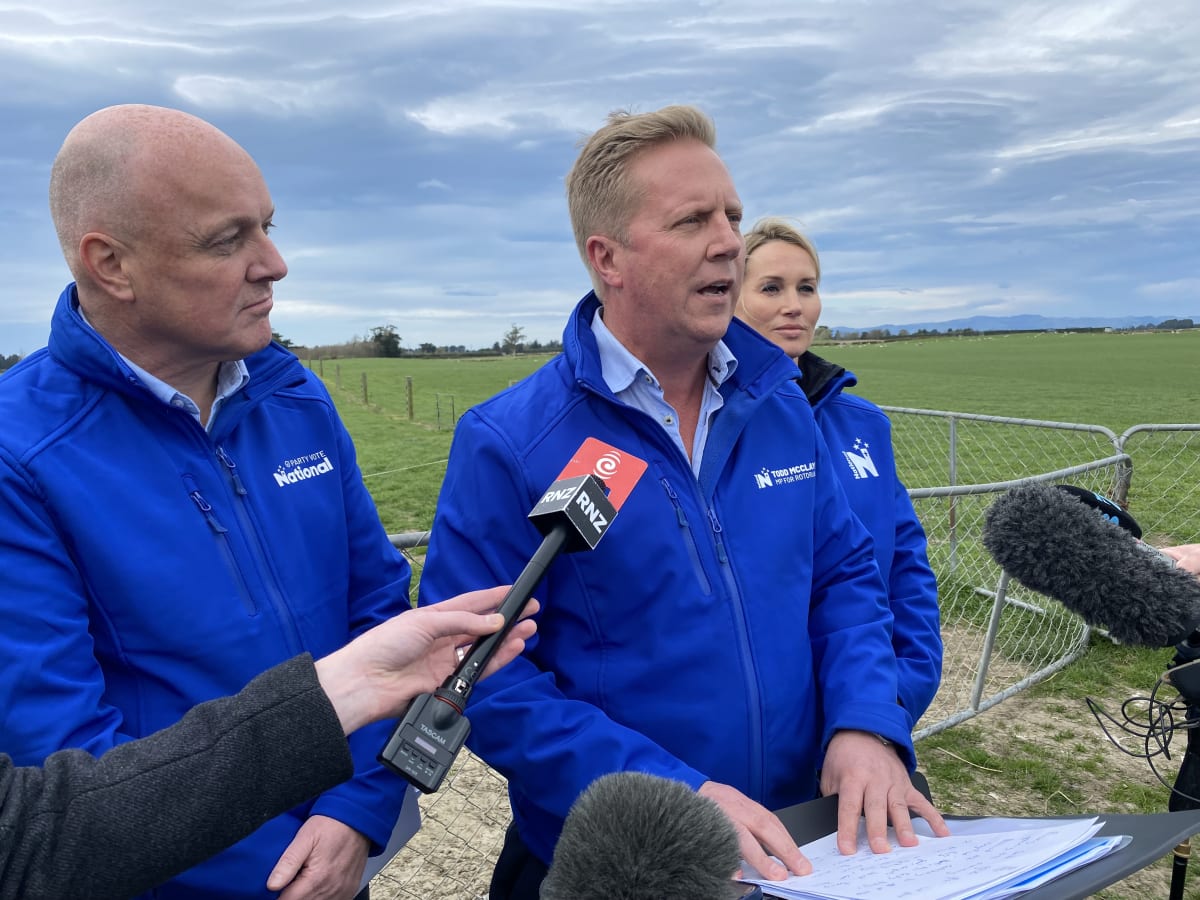
Increasing on-farm water storage panned as a ‘knee-jerk kickback’
Christopher Luxon ploughs down the line of utes and four-wheel drives, pressing the farming flesh, promising change.
The National Party leader is a few hundred metres down a shingle road, off Old West Coast Rd, west of Christchurch, in National’s safe seat of Selwyn.
The wind is strong, and so is Luxon’s confidence.
READ MORE: * National to elevate climate minister * What are National and Act doing in the shadows? * The price of failure on farm emissions
National is going to “give it heaps” on the election, he tells rural folk in the Kirwee area.
“We’ve got a great country,” Luxon quips, adding his party will go to work after the election, get the country moving, and bring positivity and aspiration.
“New Zealand’s economic recovery starts in rural New Zealand,” Luxon says at the media standup. “Last year, agriculture contributed more than three-quarters of all our goods exports. So when farmers are strong, New Zealand is strong.”
It appears National wants farmers to be very strong indeed.
National’s ‘primary sector growth plan’ says it wants to “unleash” investment in water storage, giving farmers the tools to increase production while reducing greenhouse gas emissions.
“Under a National government, storage of water on-land, for irrigation purposes, will become a permitted activity,” says National’s agriculture spokesman Todd McClay. “The requirement for consents for water-take remain in place.”

McClay, the Rotorua MP, says properly storing water, and using it when it’s most needed, leads to productivity gains, and takes the pressure off freshwater and waterways.
When it comes to water storage that still needs consents, National would also force councils to make a decision within two years. To give certainty, those consents will last “at least 30 years”. Growing fruit and vegetables commercially, for human consumption, would also be made a permitted activity under National.
The water storage announcement was music to the ears of Federated Farmers, which listed “unlocking the potential for water storage” as one of 12 election priorities.
"This presents a huge opportunity for New Zealand to increase the value, volume, and variety of our primary sector exports and supercharge our economy – and it’s arriving just as New Zealand needs it the most," says freshwater spokesperson Colin Hurst.
Complex consenting is stymying investment in “critical” water storage, IrrigationNZ chief executive Vanessa Winning says, adding that National’s policy would create certainty and encourage investment.
“This is good progress and a step toward developing a country-wide strategic approach to water resilience.”
“Rural people will be among the first and worst affected by climate change, water pollution, and contaminated drinking water, which will be made worse by these policies.” – Christine Rose, Greenpeace
Freshwater advocates are not as effusive.
There’s nothing new in the announcement, says Marnie Prickett, a spokesperson for activist group Choose Clean Water. National is recycling ideas from 20 years ago, she says.
“I don’t think Luxon or Todd McClay have learned any lessons from the disaster that Canterbury turned out to be in terms of its environmental impact.”
In 2010, it was another National leader, John Key, who promised to boost water storage and irrigation projects, and reduce regulatory “roadblocks” in Canterbury.
Figures tell the tale.
Areas of irrigated land across Aotearoa almost doubled between 2002 and 2019, to 735,000 hectares. Farming intensity increased because of a switch from sheep to dairy farming.
Modelling released earlier this year, in the Our Freshwater report, showed more than half of New Zealand’s river length had “moderate or severe impairment” because of organic pollution or nutrient enrichment. At river monitoring sites, 56 percent showed a worsening trend.
Canterbury regional council’s annual groundwater survey, published last month, showed nitrate concentrations continuing to increase.
Greenpeace Aotearoa’s climate campaigner Christine Rose says a high-volume, low-value, commodity-driven growth model is a “back to the future” policy from National which amounts to economic and ecological sabotage.
This at a time when consumers are calling for higher environmental standards.
Rose calls National’s push for more water storage irresponsible and dangerous, with the potential of making the problems of “big dairy” worse.
“Instead of supporting primary production and rural communities in New Zealand, which they claim in this policy document to aspire to, if enacted, National’s policies will threaten New Zealand’s environment and New Zealanders’ rights to clean fresh water, safe drinking water and a stable climate.
“And rural people will be among the first and worst affected by climate change, water pollution, and contaminated drinking water, which will be made worse by these policies.”

Prickett, of Choose Clean Water, says paying for water storage dams leads to more intensified land use, and degraded waterways.
“[Water storage] doesn’t become insurance for a rainy day, it becomes a central part of your farm system,” she says. “We have to do better than this.”
New Zealand seems trapped in “bonkers circular thinking”, she says. This involves increasing environmental damage, through building dams, then increasing agricultural production, which drives climate change, and this increases the desire to build more dams. And so on.
“We need to restore the natural environment, protect its health, and farm and have food and fibre production within healthy environmental limits. You don’t do that with large-scale water storage.”
Irrigation can’t be farming’s only hope, Prickett says. Other options might include more drought-resistant crops.
Of National’s policy announcement, she says: “This is just a really knee-jerk kickback to some old sort of fantastical time when we could just degrade the environment as we liked with no consequences, but actually, we know those consequences now.”
Freshwater ecologist Dr Mike Joy, of Victoria University of Wellington, says he’s happier with on-farm storage than large-scale water schemes that have to be paid for by increased farming intensity.
“That’s always the worry that if it’s going to cost money to store water then you intensify to match that water storage cost, and then we end up worse-off with water quality.”
National says it will create a new national environmental standard for water storage, but there’s little detail. That worries Joy.
“The scary thing is if a farmer has a stream running through his farm and thinks, ‘I can just whack a dam on that’, and store water that way, then we’re going to have huge environmental issues with that, and potential bloody disasters when rivers flood.”
Anything that weakens the “already weak” pollution limits is going to be worse for everyone, he says.

At the media standup, Newsroom asks what increased water storage would do for greenhouse gas emissions and water quality. (National has already committed to lower emissions from transport and agriculture in its first term.)
McClay, National’s agriculture spokesman, says people in other parts of the world can use wetlands to sequester carbon, but it’s not recognised in New Zealand. “We’ve said it will be.”
(National wants to allow farmers to build wetlands without a consent. Joy, the freshwater ecologist, says: “How about allowing farmers to stop draining wetlands?” You don’t create wetlands, he says, you just stop draining them.)
In the Kirwee area, there's a catchment-wide water storage system, owned and run by local farmers in cooperation with the local council, McClay says, “and they've driven an extra $300m worth of revenue for the New Zealand economy”.
“So good, sensible water storage means that we can actually increase our production by using less, and have better water quality for our streams and rivers. That’s the basis for our announcement today.”
Asked again about the effect of more water storage on emissions and water quality, McClay says it allows farmers to produce more with less.
“This is a win-win, both for water quality and also for the New Zealand economy when it’s done smartly.”
National will release its separate freshwater policy in the coming weeks.
Prickett, of Choose Clean Water, can’t conceive of how more irrigation and environmental protection can work together. She says an emphasis on more water storage might cascade into a rollback of freshwater rules, brought in by Labour.
“Getting rid of Te Mana o Te Wai [putting freshwater first], I think, would be a disaster for New Zealand’s waterways. It would really put us back to 20 years ago.”







